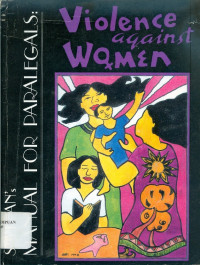
Text
Manual for paralegals: violence against women
We shall likewise look into the structures that comprise our legal system. A simple, yet deep, understanding of the legal system would help us in undertaking our roles as pararegals. Another basic knowledge of an effective paralegal is the understanding of the concept of law, which is the sphere where the paralegal works. In recent years, the challenge of expanding access to justice for the poor has received increasing attention from the international development community. Promoting justice in settings where state legal and judicial institutions and the rule of law are weak or compromised is a difficult proposition. Today, many societies, despite formal recognition of the legal rights of poorer citizens, fall short of full and effective realization of those rights in practice. In many countries, civil society spaces and organizations oriented toward legal empowerment of the poor may also be inadequate or nonexistent, and thus still limited in their potential contribution to expanding access to justice for the poor. Deepening interest in the problem of access to justice has emerged within a broader emphasis on judicial and rule of law reform as a necessary prerequisite to development more generally. Efforts to address weak state legal and judicial institutions have often focused on interventions defined in terms of creating and/or reforming the relevant rules and procedures, often based on idealized understandings of what constitutes a well-functioning system of law and justice. At the same time, more attention is being paid to increasing legal assistance to the poor in order to increase their 2 capacity to effectively use state law and institutions in the pursuit of justice.1 Legal assistance has involved diverse interpretations ranging from “legal aid” to “legal empowerment.”2 Taken together, such efforts reflect changing understandings of the processes and obstacles involved as citizens attempt to get their justice concerns met. It is no longer enough to address formal legal institutions (such as the judiciary and ministries of justice) alone; as important are: (i) how formal legal institutions actually operate in real societies, (ii) whether and how different members of a given society experience and use law in their pursuit of justice, and (iii) which strategies and practices have what effects in terms of law reform and justice.
Availability
| KP.IV.00039 | KP.IV JAJ m | My Library | Available |
| KP.IV.00039-01 | KP.IV JEJ m | My Library | Available |
Detail Information
- Series Title
-
-
- Call Number
-
KP.IV JEJ m
- Publisher
- Manila : Sentro ng Alternatibong Lingap Panlegal (SALIGAN)., 1999
- Collation
-
132 hlm. :ilus; 28 cm
- Language
-
English
- ISBN/ISSN
-
-
- Classification
-
KP.IV
- Content Type
-
-
- Media Type
-
-
- Carrier Type
-
-
- Edition
-
-
- Subject(s)
- Specific Detail Info
-
-
- Statement of Responsibility
-
-
Other version/related
No other version available
File Attachment
Comments
You must be logged in to post a comment
 Computer Science, Information & General Works
Computer Science, Information & General Works  Philosophy & Psychology
Philosophy & Psychology  Religion
Religion  Social Sciences
Social Sciences  Language
Language  Pure Science
Pure Science  Applied Sciences
Applied Sciences  Art & Recreation
Art & Recreation  Literature
Literature  History & Geography
History & Geography